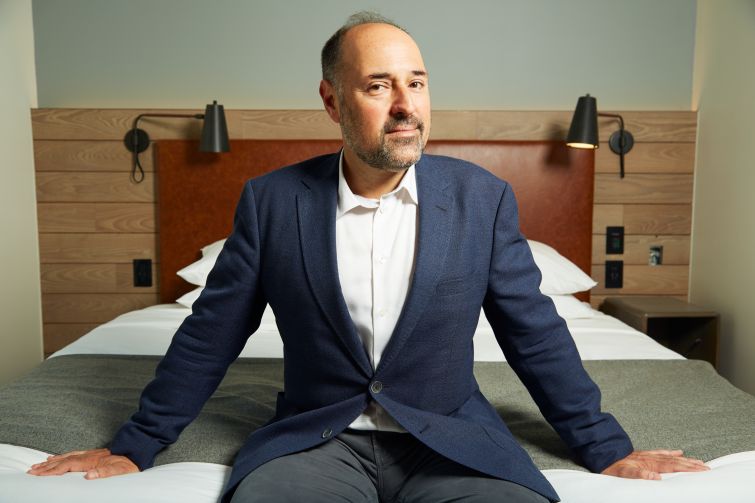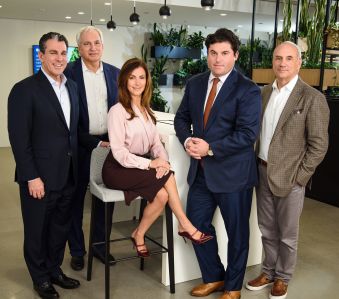Tribeca Associates’ Mark Gordon Talks About How He Built the Moxy and Baccarat Hotels
By Alison Rogers July 18, 2018 9:30 am
reprints
It was a mall that got Mark Gordon interested in hotels. As a young analyst at Sonnenblick Goldman, a then-prominent real estate investment bank, Gordon was junior on two deals. One was the refinancing of a mall in Harrisburg, Penn. The other was a transaction involving a Hilton hotel in Aruba—a project that required travel. “I quickly concluded that the hotel deal was more interesting,” Gordon said.
Nearly three decades later, Gordon, 50, is a master of the hotel industry, having learned the business in multiple roles. In a reversal of the maxim “those who can’t do, teach,” he jumped off the sidelines and into the game, moving from being an adviser to the industry (he spent nearly 17 years at Sonnenblick) to becoming a developer of New York City hotels. In eight years at Tribeca Associates as a managing partner, his projects have ranged from the glittering, high-end Baccarat Hotel in Midtown to the soon-to-be-opened Moxy Downtown with its clubhouse vibe. Last year, he moved into the fun of funds, launching an independent company, Intrinsic Hotel Capital, with the aim to raise and spend as much as $500 million on strategic hotel investments nationwide.
A relentless worker, Gordon is detail-oriented but not twitchy—the kind of guy who inspects the grout on all of his projects, but doesn’t throw the phone if something isn’t up to snuff. One way he maintains his keel is simply by clocking a lot of hours on the job—he’s often in the car at 6:15 a.m. on his way to the city from his home in Armonk, where he lives with his wife, Amy, and his teenage son and daughter.
“Sometimes the beginning of the day and the end of the day blur together,” Gordon noted. “But I think sometimes people, especially kids new to the business, lose sight of the work element of success.”
“Mark is tireless in his work ethic,” said Joe Vassallo, the co-founder of Intrinsic Hotel Capital, who has known Gordon for decades. (They met when Vassallo, who was formerly at Donaldson, Lufkin & Jenrette and Credit Suisse, was a lender on one of Gordon’s deals). “He can juggle more things than most humans can.”
Gordon grew up in Woodmere, Long Island, a community known as one of the Five Towns, a suburban aggregate famous for its pleasant homes, easy commute and good schools.
“My father was an accountant and a real estate investor, and my mother was a homemaker,” Gordon said. After Ithaca College, he moved to New York City to work for Williams Real Estate (then a prominent leasing and management company), now part of Colliers International. He lived in an alcove studio on the East Side at East 55th Street, between First and Second Avenues and worked Downtown, though the area was very different from today.
“In 1989,” Gordon recalled, “I was the managing and leasing agent for 11 Park Place [a Gothic office tower across from the Woolworth Building that is now a WeWork] but Park Place was a street that most people had never heard of. Woolworth was still in the Woolworth Building.”
At that job, Gordon worked directly with Robert Carmel, one of Williams’ legendary partners. “He taught me the office management and leasing business,” Gordon said. At night, he went to New York University, getting his master’s degree in real estate finance. The diploma gave him a base to transition to Sonnenblick, building models and putting together deal books.
For his first six years at Sonnenblick he was under the tutelage of Jack Shaffer, a legendary hotel dealmaker. During this time Blackstone Group completed its acquisition of the Savoy Group, owner of the London landmarks the Connaught and Claridge’s. Gordon climbed the ranks from associate to analyst to vice president to managing director. But then in 2000, a company upheaval saw the departure of Shaffer and many of the firm’s other managing directors, and Gordon was invited to join the ranks of the remnants as partner. He did, becoming head of the firm’s lodging and leisure group, and taking on the task of building a real estate advisory group. “I figured if it didn’t work out, I would be able to get a job,” he said.
The next several years involved building the business.
Sarah Korein, a nonagenarian great-grandmother with a genius for cap rates, had died, leaving behind an empire that stretched from the land under Lever House to One Penn Plaza. Her beneficiaries hired Gordon’s group to sell one of their crown jewels, the Delmonico Hotel at 502 Park Avenue and East 59th Street. The hotel, which had been converted from a luxury apartment building had a prime location, but also a number of negatives, including a savvy tenant who would no doubt know how to stay put—the late, prominent real estate developer William Zeckendorf Sr.
“We started marketing it as a hotel redevelopment play and residential conversion,” Gordon remembered. “Then we took a few months’ pause after 9/11, and resumed marketing it in 2002.”
The winner of the four bidders was a brash investor—The New York Times reported at the time that his financing package was still being put together —named Donald Trump. “He was great to work with,” Gordon said. “What stands out was his general confidence in the plan. Some of the other interested parties were worried, ‘could we get the penthouse back?’ Trump was sure that we could work something out.”
Cushman & Wakefield ended up buying a majority stake in Sonneblick in 2007. Gordon said “it was challenging to go from a small business to a big company,” but he noted that being on the advisory side somewhat insulated the group from the Great Recession. “If you’re on the advisory side,” he noted, “whether the economy is good or bad, your clients need your advice.”
In 2010, though, Gordon decided to move into a developer role. He joined Bill Brodsky and Elliott Ingerman as a partner at Tribeca Associates. The former two had already successfully bought and sold the New England Confectionary Company, a.k.a. the Necco wafer building, in Cambridge, Mass., and the Penncom Plaza office building at 132 West 31st Street. With Gordon’s hotel expertise, however, Tribeca Associates attacked the project of co-developing a hotel in Midtown across from the Museum of Modern Art. The Baccarat Hotel and Residences features 113 hotel rooms and 61 luxury condos. The land was purchased, Gordon recalled, in 2011 for $55 million.
The project, undertaken with Starwood Capital Group, involved the acquisition of a light and air easement from neighboring properties. More significantly to the community, the Donnell Library, a neighborhood-focused branch of the New York Public Library that was the heart of the site, was closed for seven years. “People were critical of the fact that the library was closed,” Gordon said. “But we brought it back.”
The library now occupies three lower levels of the 550-foot tower.
The public spaces of the hotel are elaborate, full of spheres of rose blossoms set against black and white backdrops, while Baccarat glassware and chandeliers and even a curtain wall—more than 15,000 pieces of crystal in all—provide shimmer and shine. The joint, where Commercial Observer shared a $12 coffee with Gordon, looks like a glittering “before” location for an action movie fight.
The allure is strong. In 2015, the hotel was sold to Sunshine Insurance, a Chinese firm that paid some $230 million, an eye-popping $2 million per room. It was a great time to exit, but it also left Gordon searching for a new challenge. He found it in 2017 with the formation of Intrinsic Hotel Capital, an investment platform set up to revamp existing properties rather than do ground-up development. The fund, which is a side hustle for Gordon, was started with Vassallo. “We’re both career hotel people,” Gordon said. “A lot of people go in and out of the business based on where we are in the cycle, but [Vassallo] and I aren’t like that.”
The idea behind Intrinsic is that it will allow the partners to work in B and C markets, looking nationally for opportunities instead of domestically. The fledgling firm, at 21 West 46th Street in a coworking space in Midtown West, has yet to close a deal, but for Gordon the pursuit seems as enjoyable as the purchase. He noted, when asked about the ramifications of the tax bill, that if corporate spending rises, that would be a net positive for the hotel industry.
Of course, that doesn’t mean Gordon has quit his day job. “What most people don’t realize about Mark,” Vassallo noted, “is that for him, having a couple of full-time jobs is like having excess capacity for five more jobs.”
Gordon said that his family life in Westchester recharges him. “My teenage son just got his learner’s permit, so now I have a chauffeur on weekends,” he joked.
Back in the city, Tribeca Associates is set to open the 30-story, 298-key Moxy Downtown, a mid-priced hotel/clubhouse for millennials in Lower Manhattan, an area of the city that Gordon insists is still under-hoteled. Moxy is a Marriott affiliate, and in keeping with current design trends, the rooms will be efficient boxes (the baths will have showers instead of bathtubs, for instance) but with luxury touch points such as oversized TVs, leather headboards and a guest chair that hangs from the ceiling (which can bear 1,000 pounds of weight).
Insert your plastic card room key into its slot and the window shades will lift, providing a futuristic effect worthy of a Peyton Reed movie. (Don’t worry, you can use your iPhone as your room key, too). The 185-square-foot guest rooms will go for $295 a night.
But the heart of the Moxy located at 26 Ann Street will be its shared spaces, with an atrium lobby containing a giant LED wall on the first floor, and culminating in a 5,000-square-foot “ultimate hangout space” with 20-foot-ceilings, a bar, a lounge, arcade games, and, of course, a basketball court.
This modern clubhouse on the third floor is envisioned as a space that will allow both guests and neighborhood denizens to work during the day and party at night. “Guests will be encouraged to hang out wherever they want,” Gordon said. “People go to hotels for the social aspect, and that’s one of the things that Airbnb can’t provide.”
It’s certainly the kind of experience that is currently lacking in the Financial District. Colby Swartz, a senior managing director at Suzuki Capital, a real estate and hospitality development firm, noted, “What they offer within the Moxy itself, they’ll be able to draw a vibrant crowd, which brings its energy with it.”
Gordon waxes enthusiastic about every detail of the experience, from the gray subway tile in the bathrooms (he argued for it as a departure from the white that Marriott had originally proposed) to the third floor main room/clubhouse’s big skylight over the bar. “The developer’s job is to distill everyone’s creative juices into a positive flavor,” he said. “And I have the luxury of enjoying the people I work with.”
Can he keep doing it for decades? Probably. “I like working,” Gordon said. Then, unusual for a successful executive, he ruefully held up a blistered, bandaged thumb. “Besides,” he said, “I can only play so much golf.”


